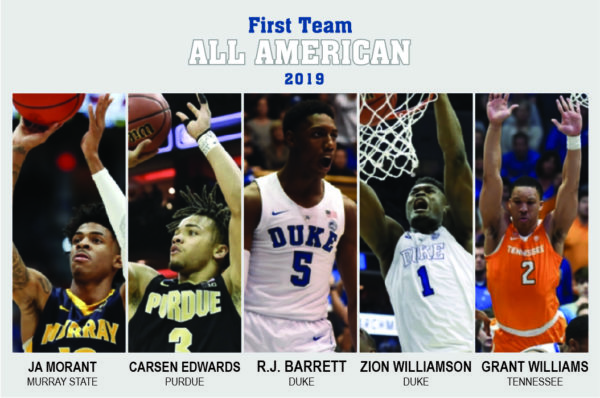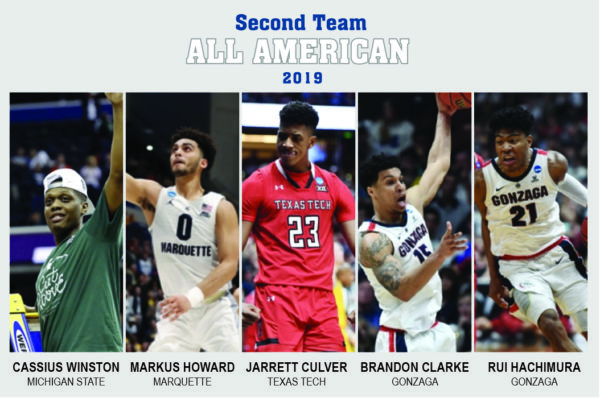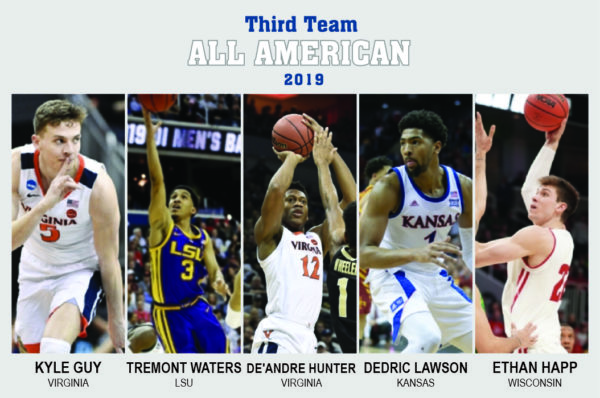2018-19 Rush the Court All-America Teams
Posted by Walker Carey on April 4th, 2019Compiling preseason All-America teams is a difficult task because nobody knows what will come during the regular season. There will always be several players who fall short of expectations and there will always be several relative unknowns who unexpectedly emerge to stardom. When our unit of RTC pollsters selected their preseason All-American teams in November, nobody could have guessed that 10 of the 15 players chosen would live up to that lofty standing: Purdue’s Carsen Edwards; Duke’s R.J. Barrett; Duke’s Zion Williamson; Tennessee’s Grant Williams; Marquette’s Markus Howard; Virginia’s Kyle Guy; LSU’s Tremont Waters; Virginia’s De’Andre Hunter; Kansas’ Dedric Lawson, and Wisconsin’s Ethan Happ.
Here are the 2018-19 RTC All-America Teams.
First Team All-America

- Zion Williamson, Freshman, Duke (consensus) (22.6 PPG, 8.9 RPG, 68% FG). He may only be one player, but make no mistake about it, this college basketball season belonged to Williamson. You could not go one day without hearing something new about the freshman phenom — and with good reason — he made every Duke game this winter appointment television with his numerous highlight reel dunks and spectacular defensive plays. When the freshman was not busy igniting the internet with viral videos of his jaw-dropping plays, he was calmly and confidently leading his young Duke team to the ACC Tournament title and the overall #1 seed in the NCAA Tournament. Williamson was the most important cog in a Blue Devils squad that finished the season with a 32-6 record, and his importance was never more evident than when he was sidelined for six games late in the season and Duke went just 3-3 during that stretch. While it is certainly disappointing that Williamson will not participate in this weekend’s Final Four, he definitely used his time in college basketball wisely and cemented that the name Zion Williamson will live on in college basketball lore.
- Carsen Edwards, Junior, Purdue (24.3 PPG, 2.9 APG, 1.3 SPG). Purdue was picked fifth in the preseason Big Ten poll, largely because — other than the returning Edwards — not much was known about a club facing the tall task of replacing four starters from last season’s Sweet Sixteen team. That challenge was tough at first, as Purdue sat at just 6-5 following a rough loss to Notre Dame on December 15. That loss ended up being a turning point for the Boilermakers, as they rode the heroics of Edwards and figured out their personnel en route to a 26-10 overall record and a share of the Big Ten regular season title. While Edwards certainly had a wonderful regular season, his place on the first team was guaranteed with an amazing effort throughout Purdue’s run to the Elite Eight. The junior point guard tallied 26 points in a First Round win over Old Dominion and it only got better from there, catching fire in a Second Round mauling of defending champion Villanova, and finishing with 42 points on a smoldering 9-of-16 performance from behind the three-point line. His exploits then reached another level in the South Regional, going for 29 points in leading Purdue to an upset overtime win over Tennessee in the Sweet Sixteen, before reaching an apex in an all-time performance of dropping 42 points (10-of-19 from three) in a heartbreaking overtime loss to top-seeded Virginia. While Purdue fell short of its ultimate goal of the Final Four, Edwards did his part in carrying the Boilermakers to a place the program had not been since 2000.
- Ja Morant, Sophomore, Murray State (24.5 PPG, 10.0 APG, 5.7 RPG, 49.9% FG). Becoming a must-see attraction while playing in the Ohio Valley Conference is difficult to do, but Morant accomplished that feat this season with flying colors. The dynamic sophomore guard became the first player since the NCAA began tracking assists in 1983-84 to finish a season averaging 20+ points and 10+ assists per game. He also led Murray State through the Ohio Valley Conference Tournament gauntlet to propel the Racers to their second straight NCAA Tournament. Along the way Morant caught the eyes of NBA Draft connoisseurs, firmly establishing himself as a top prospect for this summer’s annual selection meeting. In the postseason, the explosive sophomore gave his program a final lasting memory, as he recorded the NCAA Tournament’s first triple-double since 2012 in the Racers’ First Round upset victory over Marquette. Morant’s collegiate career may have only lasted two seasons, but he certainly made his mark as one of the all-time greats to pass through the Ohio Valley Conference.
- R.J. Barrett, Freshman, Duke (22.6 PPG, 7.6 RPG, 4.3 APG, 45.4% FG). Barrett may have been Duke’s “other freshman star” this year, but that did not keep him from establishing himself as one of the country’s best players in addition to Williamson. Known mostly for his scoring prowess, Barrett also showcased his passing and rebounding talents throughout the season. The freshman swingman twice tallied double-figure assists and grabbed 10+ boards nine times. Barrett’s premier performance came in Duke’s victory at Virginia when he turned in a game-high 26 points on a smoldering 6-of-10 performance from the perimeter. While Barrett put up big statistics throughout the regular season, his most noteworthy contribution during his freshman campaign came in Duke’s Second Round NCAA Tournament victory over UCF when he rebounded a missed free throw and converted a layup with 14.4 seconds to play to give the Blue Devils a 77-76 lead that they would not relinquish.
- Grant Williams, Junior, Tennessee (18.8 PPG, 7.5 RPG, 3.2 APG, 56.5% FG). Williams followed up a terrific sophomore season with an even more outstanding junior campaign in Knoxville. Tennessee tied a program record with 31 wins this season and Williams’ contributions were the leading factor in the Volunteers accomplishing that feat. The big man tallied double-figure points in 19 of his 21 SEC games and his ability to hurt opponents both from the mid-range and finish through contact around the rim made him a nightmare match-up. Williams’ most noteworthy performance came in Tennessee’s overtime win over intrastate rival Vanderbilt when he saved the Volunteers by delivering a career-best 43 points while draining all 23 of his free throw attempts. The junior’s excellent season led to him earning AP First-Team All-America honors, becoming Tennessee’s first player to garner that honor since way back in 1983 (Dale Ellis).
Second Team All-America

- Cassius Winston, Junior, Michigan State (18.9 PPG, 7.6 APG, 46.7% FG, 40.4% 3FG). Michigan State is known for having its fair share of great point guards to come through East Lansing. Winston earned his place among that talented crowd with an excellent junior campaign where he not only earned Big Ten Player of the Year honors, but also led the Spartans to a share of the Big Ten regular season title, the Big Ten Tournament title, and a trip to the Final Four. Michigan State had somewhat of a chaotic regular season because of injuries to key players, but Winston’s consistency at the point guard position allowed the Spartans to navigate those choppy waters and remain on track to potentially bring home the program’s first national title since 2000.
- Markus Howard, Junior, Marquette (25.0 PPG, 3.9 APG, 40.3% 3FG). Howard was arguably the most feared scorer in the country this season — when he was hot, all bets were off as he had the ability to single-handedly lift Marquette to victories. This was never more evident than when the Golden Eagles vanquished conference foe Villanova in a nail-biting 66-65 win in February. In that victory, Howard tallied 36 of the team’s 66 points and routinely fought through ferocious double-teams to get his buckets.
- Jarrett Culver, Sophomore, Texas Tech (18.9 PPG, 6.4 RPG, 47.6% FG). Texas Tech is having its best season in program history, as the Red Raiders ended Kansas’ streak of 14 straight regular season Big 12 titles and are heading to their first Final Four this weekend. Culver has been the heart of the hard-nosed Texas Tech squad all season, providing the Red Raiders with defensive tenacity and a penchant for taking over games offensively. His role as Texas Tech’s straw that stirs the drink was shown in his 31-point effort in the Red Raiders’ win at Iowa State that clinched the conference title, and in his 22-point takeover performance in a dominant Sweet Sixteen victory over Michigan. If Texas Tech is able to defy the odds and cut down the nets in Minneapolis on Monday night, Culver’s contributions will be a major reason why.
- Rui Hachimura, Junior, Gonzaga (19.7 PPG, 6.5 RPG, 59.1% FG). No player in the country experienced a two-year meteoric rise quite like Hachimura. As a freshman, the Japanese native averaged just 4.6 minutes per game and did not see any playing time in either the 2017 Final Four or Championship Game. Needless to say, Hachimura’s development has been nothing short of amazing, as his junior season saw him lead a Gonzaga offense that led the country in efficiency while scoring at least 20 points in 21 of the team’s 37 games.
- Brandon Clarke, Junior, Gonzaga (16.9 PPG, 8.6 RPG, 3.2 BPG, 68.7% FG). The San Jose State transfer exploded onto the scene during his first season in a Gonzaga uniform. In just his sixth game, Clarke dominated the paint in the Maui Invitational title game victory over Duke, finishing with 17 points and six blocks. That effort turned into a season-long trend that resulted in Clarke becoming arguably the best defensive player in college basketball. Clarke saved his most impactful performance for Gonzaga’s Second Round win over Baylor in the NCAA Tournament. In that victory over the Bears, the junior forward scored 36 points and blocked five shots, joining David Robinson and Shaquille O’Neal as the only players to ever score 30+ points and block five or more shots in an NCAA Tournament game.
Third Team All-America

- Kyle Guy, Junior, Virginia (15.2 PPG, 4.6 RPG, 42.7% 3FG). Virginia’s season is set to finish with a much more palatable ending than last season’s embarrassing loss to UMBC in the First Round of the NCAA Tournament. The Cavaliers are headed to the Final Four this weekend, and for that, they can thank Guy for his second half heroics that allowed Virginia to sneak by Purdue in the Elite Eight. Guy, the team’s leading scorer, put up 21 of his team-high 25 points after the half and hit big shot after shot to ensure Virginia stayed within striking distance down the stretch. A convincing argument can be made that if Guy had not broken out of the slump that had plagued him throughout the early part of the NCAA Tournament, Virginia would not be in its first Final Four since 1984.
- Tremont Waters, Sophomore, LSU (15.3 PPG, 5.8 APG, 2.9 SPG, 43% FG). LSU ended its season with decidedly negative headlines overshadowing a season in which the Tigers won the outright regular season SEC title. Waters was the control man for an LSU squad that advanced to the program’s first Sweet Sixteen since 2006. It was Waters, in fact, that threw in the game-winning lay-up with 1.6 seconds to play that lifted the Tigers over Maryland and into the second weekend. This season’s LSU team is more likely to be remembered for things that happened off the court, but that does not mean you should discount what Waters accomplished on the hardwood.
- De’Andre Hunter, Sophomore, Virginia (14.9 PPG, 5.0 RPG, 51.8% FG, 42.4% 3FG). It was Hunter’s injury suffered in last year’s ACC Tournament that set the ominous tone for Virginia’s miserable postseason last year. Fully recovered, Hunter has flourished as a sophomore perfectly suited for Tony Bennett’s system. His length defensively has routinely created insurmountable issues for opponents while his knack for effectively taking the ball to the rim paired with his excellent outside shooting has made him nearly impossible to effectively defend. Fair or not, Virginia has a reputation for playing a dull brand of basketball — those who hold that opinion should tune into the Final Four because nothing about Hunter’s game should be considered dull.
- Dedric Lawson, Junior, Kansas (19.4 PPG, 10.3 RPG, 49% FG). The Memphis transfer was a double-double machine during his first season in a Kansas uniform. The Jayhawks experienced a down year relative to their normal success, caused by injury, suspension, and other roster issues, but Lawson still produced at a high level night in and night out. According to kenpom.com, the forward finished in the top 15 in the Big 12 in percentage of minutes played, usage rate, true shooting percentage, offensive and defensive rebounding rate, block percentage, fouls drawn per 40 minutes, and free-throw shooting percentage.
- Ethan Happ, Senior, Wisconsin (17.3 PPG, 10.1 RPG, 4.5 APG, 53% FG). The senior forward was a model of consistency throughout his four seasons in Madison. In an era where forwards often have a tendency to become perimeter players, Happ remained a true post player, as he did not even attempt a three-point field goal during either of his last two seasons at Wisconsin. While most of Happ’s acclaim came from his ability to score and rebound, he was also a very good passer. He was the only player in the country to average at least 16 points, 10 rebounds and four assists per game — joining former LSU All-American Ben Simmons as the only players to put up those marks in the last 20 years.
Honorable Mention: Ty Jerome, Virginia; Coby White, North Carolina; Cam Johnson, North Carolina; P.J. Washington, Kentucky; Admiral Schofield, Tennessee.









































